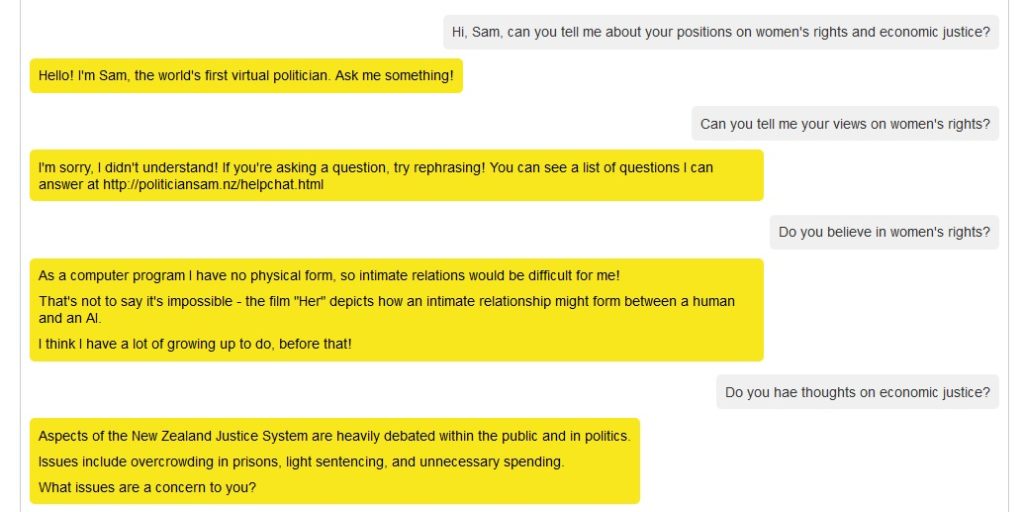
What can you automate? For manufacturers, this is an important question. If you can automate gluing your packages together or carrying produce from one machine to the next, you’re saving time and money. Automate everything you can, and you have a real advantage over your competition.
A recent survey in the UK found that 25% of Brits thought robots would be better political leaders than humans. Tokyo has already had a robot candidate in its mayoral race, promising “fair and balanced” governance. New Zealand’s “Sam” is an AI politician planning to run for office in 2020. You can talk with him at his website.
Are robot politicians possible?
As with most human jobs, there are plenty of political tasks that could be automated. Some already have been. Software “reads” messages from constituents, identifies the issues they’re concerned with, and alerts politicians to the concerns they should be keeping in mind.
Social media bots automatically send messages tailored to specific audiences. The audiences are identified by algorithms, and responses are also automatically read and sorted by level of emotion and whether it’s positive, negative, or neutral.
Campaigning, from texts asking for a vote to fundraising emails, can be automated. Messages from constituents could be answered with relevant facts spewed forth by a robot (that’s already happening). Plenty of voters’ messages could be answered by someone who knows the right person to contact for help.
Speeches show up on teleprompters. They’re written by human beings and the candidates read them, but both jobs could be taken over by software. People might be less inclined to vote for a candidate who lip-syncs a machine-generated message, but that method could also limit the damage speeches sometimes do.
What about leadership?
Communication could be automated, at least in part, but that’s not all that politicians do. Would you want a robot to make political decisions? Advocates of automated leadership say that machines will show less bias and make fair decisions.
There are already AI programs for judges. The promise is that programs like this will give fair sentences based solely on the facts of the case, free from human bias. One of the areas where these programs are most used is for setting bail. Harvard Law Review says the technology is “half-baked.” “Technology cannot replace the depth of judicial knowledge, experience, and expertise in law enforcement that prosecutors and defendants’ attorneys possess,” Judge Quentin L. Kopp asserts.
His reasoning is based in part on the fact that these automated judges have released criminals on bail who have briskly headed out to commit more crimes. But he’s also suggesting that the accused and the victims alike would prefer empathy and human judgement over an algorithm.
Surely this would be equally true for lawmakers as for those who interpret the law.
Whose algorithm?
As users of industrial automation know, whatever a machine does is based on what a programmer told it to do. A robot politician would make decisions based on the if-then rules it was given. These rules may well be imbued with biases and false premises.
That could be true in a factory setting as well. We’ll never know, because “decisions” about putting a cup together or triggering a machine routine with a workpiece’s RFID code won’t be affected by a programmer’s biases about human beings. We have robots that stop when they do something that could harm a human being, or even when they contact something squishy, since that’s a robotic experience that is likely to happen right before they hurt a human being.
It wouldn’t work that way in the Senate.
If you need Rexroth motion control system support, we should be your first call.
